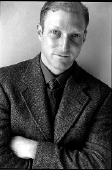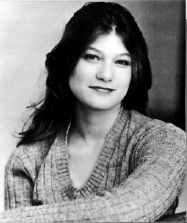Frequenting transsexual hangouts and hiring a spankologist

New York, New York. Just the place for a Fitzgerald-worshipping, young- gentleman-about-town wannabe, nice Jewish boy from New Jersey with a penchant for transsexuals to find himself. The Extra Man, Jonathan Ames '87's second novel, is a charming and wry coming-of-age story with a few little twists. Recounting activities such as cross dressing, paying $40 per hour to get spanked by a "recession spankologist" in her 60s, or frequenting transsexual prostitutes could be used to spoof or subvert the coming-of-age genre. Yet -- despite its unconventional subject matter -- one of the most interesting things about this novel is its embrace of the conventions of the coming-of-age story.
The novel's main character, Louis Ives, is profoundly concerned with fitting in and appearing respectable. When we are introduced to him, he is 26, jobless, friendless, and without family. He's just lost his position teaching English at Princeton's Pretty Brook Country Day School, a turn of fate that occurs after the headmaster's wife walks into the teachers' room and catches Louis trying on a fellow teacher's bra over his oh-so-gentlemanly tweed jacket.
Louis is sexually confused, neurotic about being Jewish and balding, and subject to annoying fantasies involving his gentlemanly aspirations. Despite this, he is a supremely sympathetic character, in part because he is self-deprecating, and in part because he is entirely alone in the world. His affectations, which include dressing like his favorite authors and never wearing sneakers, are part of the "fantasy that I wore like armor to get me through the day....It made loneliness feel like a movie." Ames's writing is witty and low-key, an appealing combination that serves to pull the reader into Louis's strange world.
Louis moves to New York to find himself "and get a fresh start." In short order he finds a room to rent, he finds a job, and he finds himself reading the sex listings in The New York Press.
The room is in the apartment of one Henry Harrison, an elderly man whom Louis comes to worship. Louis sees Henry not merely as the embodiment of all that is gentlemanly, but as his soulmate: "I had been living as a gentleman all by myself, but now I could do it in the company of someone who understood." Henry, who claims to be a writer and an actor, spends much of his time as an "extra man," escorting wealthy, decrepit women around New York and Palm Beach. Henry is a legend in his own mind, but Louis buys into his act wholeheartedly and spends much of his energy longing for Henry's love and approval.
Louis gets a job at an environmental magazine, a workplace that, while tortuous for him, is hilarious for the reader due to Mary, a beautiful blonde coworker of whom he says, "I was so attracted...that I was repelled." His reactions to her are exaggerated to the degree that when she says hello, he thinks, "Why are you doing this to me?"
It's through Louis's perusal of the sex listings that he discovers Sally's, a club for transsexuals. Despite his occasional resolutions to forsake Sally's and his wish to "be part of the regular world...to go out with normal girls," he finds himself at Sally's time and again. Becoming a regular at Sally's was not what Louis intended when he set out for New York and self-discovery. But that's the thing about finding yourself--often, there are surprises. And then there's learning to live with what you find...but that�s another novel.
--Andrea Gollin '88
Eating compulsively, or not at all
Inner Hunger:
A Young Woman's Struggle Through Anorexia and Bulimia
Marianne Apostolides '94
W.W. Norton, $22

Inner Hunger is Marianne Apostolides '94's account of her 10-year battle with anorexia and bulimia. "Releasing yourself from an eating disorder is not a linear process," Apostolides '94 warns readers who may be seeking a quick fix in these pages. "There aren't twelve steps you must walk to get to the finish line. Instead there is your own path with dead ends and steep climbs."
Straightforward and honest, Apostolides recounts her love-hate battle -- mostly hate -- with food, detailing its toll on everyone and everything in her life. Apostolides's narrative is strongest when she describes her compulsive behaviors and their attendant thoughts. "If I ate twenty flakes of cereal for breakfast one morning," she explains, "I had to eat twenty the next day." During bouts of uncontrolled eating, she writes, "On some nights, I had to search for food in the garbage or take scraps out of the dog's bowl. Whatever I could get, whatever I could find." The inner monologue that attends her eating, particularly her binge and purge orgies, is a relentlessly cruel litany of self-loathing. "Look at that gut. Disgusting. It blobs like cottage cheese....Do some push-ups, Marianne, get your arms small again. This is disgusting!"
When Apostolides strays from food to address her relationships with her parents, brother, assorted lovers, and various therapists, she is less persuasive. Apostolides, still relatively new to recovery, might have produced a more insightful memoir had she had more distance from her suffering.
Still, for people who have never experienced an eating disorder, Apostolides opens a window on a fascinating and strange world. For readers who worry about a particular person who is anorexic or bulimic, she offers insights into the issues that underlie such disorders. Finally, for those who currently suffer, Apostolides is likely to prove a welcome companion, whose struggles will ring true and whose hard-won recovery may inspire hope. Her concluding section offers general advice to schools, families, and sufferers about obtaining effective treatment.
-- Jill Smolowe '77
Jill Smolowe is the author of An Empty Lap, recently released in paperback by Pocket Books.
Boxing's last heavyweight champion
King of the World:
Muhammed Ali and the Rise of an American Hero
David Remnick '81
Random House, $25
At this time, century's end, when paeans to Muhammed Ali have already begun to cascade upon us, David Remnick '81 has wisely limited himself to the task of examining those early years in the great fighter's career, when he was more a conflicting figure of curiosity or antipathy than he was adored -- "the warrior who came to symbolize love." Even at this remove of 35 years, though, the challenge is considerable, because so very much of Ali's existence has been endlessly documented and picked over. No athlete has had a more examined life. Nor is there anything in the air to suggest that there can ever be any shocking revisionist history.
So, in less skillful hands, the ofttold journey of Cassius Clay, prankster and Olympic gold medalist, on his way to becoming Muhammed Ali, idealist and heavyweight champion, could have been a terribly shopworn guide. Deftly, though, Remnick has picked his spots; also, he has leavened the formative years of Clay/Ali with some dandy sketches of various contemporaries, who lend fresh tone to the familiar tale. There is the selfflagellating Floyd Patterson and his mystical manager, Cus D'Amato, "who looked like a cross between the Emperor Hadrian and Jimmy Cagney;" the insufferable Jimmy Cannon, then (preCosell) the brightest boutonniere midst all the flower of sports journalism; and, of course, Sonny Liston, who served so well as Clay's foil. "Liston trained," Remnick writes, "the way Liberace played piano; it was a garish representation of a boxer at work."
The author is not quite so sharp at painting the bizarre and motley characters who made up the young boxer's swelling entourage (would that he could help us explain Angelo Dundee better), but then, Remnick makes up for that minor deficiency by providing a full and fascinating history of Clay's courtship with the Nation of Islam. To me, anyway, this was the most original work in the book. Especially illuminating is Remnick's accounting of the young boxer's sweet friendship with Malcolm X -- until at the end, Ali utterly denies him. There was a curious cruelty to Ali then that occasionally surfaced.
In a way, Muhammed Ali is the end of boxing history, the last
heavyweight champion who will ever be remembered for holding that title --
one which Murray Kempton dismissed as what "is, after all, a fairly squalid
office." As Remnick himself concludes, boxing
"is finally indefensible.
...There is beauty in it...but if you meet enough former
boxers, if you try to decipher their punchdrunk
talk, you begin to wonder. What beauty is worth this?"
I gather from Remnick's bittersweet biography that, anyway, he believes Muhammed Ali was so pretty he was worth that high price.
-- Frank Deford '61
Ruth Gerson '92, an independent musician

In the world of popular music, where "selling out" is an offense more shameful than singing off key, singer-songwriter Ruth Gerson '92 can hold her head up high. Gerson is truly independent, an ambitious artist who manages to be totally self-supporting: She does her own booking, hires her own musicians, and spends countless hours mailing out tapes and publicity material. In what little time is left, Gerson writes new material and performs, solo and with a band, in clubs, theaters, and at festivals all over the U.S., Israel, and Europe. It's a nerve-wracking, close-to-the-bone existence, but it does mean that she gets to call all the shots and needn't entertain the helpful suggestions of bean-counting record executives. "Of course I'm always pursuing what could happen on a higher level, but I'm not dependent on it," says Gerson. "I don't want to be [country star] Shania Twain. I'd rather fail."
Gerson studied Jewish existentialism at Princeton, and her lyrics manage the tricky feat of reflecting centuries of literature and myth but making it all sound fresh, never bookish. Her two independent CDs, Very Live and Fools and Kings, have sold 16,000 copies while earning rave reviews and fans in high and faraway places. The New York Times praised her music for its "bracing mixture of defiance and open-heartedness," while Elle crowned her "the new poet of rock."
One day she got a surprise call from Bob Dylan's manager, telling her that the old poet of rock was a big fan and wanted to meet her. The two hung out for an afternoon playing guitars and talking music. And Dylan has company. All of Italy seems to have a thing for Gerson. In a poll of its readers last winter, Buscadero, Italy's biggest music magazine, named Gerson the second-best female vocalist of 1997, behind only Patti Smith, and far ahead of heavyweights like Sheryl Crow, Jewel, and Joni Mitchell.
Gerson pulled off quite a coup with Fools and Kings, by persuading Don Dixon, the legendary producer of such groups as R.E.M. and the Smithereens, to work on it. Though their original deal called for Dixon to produce just a four-song EP, he was so impressed by Gerson's songs that he signed for the entire album, contributing not just guitar and organ but even changing the way she sang. "He had to get me to sing less correctly," laughs Gerson, who in mid-September began a six-week tour of Italy, Austria, and Germany. "He kept saying, 'Don't sing so well!'"
Straddling the line between folk and alternative rock, Fools and Kings kicks off with "I Want What You Want," a song about our search for meaning driven by a crunching, distorted guitar hook. The other 12 tracks range widely, from the delicate, finger-picked guitar intro to "Summer Waters" to the funky shuffle of "The Weakest Link in the Chain." Especially ambitious is "Shoah," a stark, a capella song about a concentration camp.
Very Live, Fools and Kings, and Gerson's new live CD, Not Around Town, can be ordered via email at ruthgerson@juno.com or by telephoning 212-592-9049.
-- Merrell Noden '78
Web Sightings
Baseballs and dishwashers: Two sites for shopping online
www.sportscape.com
Founded by Dan Cunningham '97 and Joshua Roman '97, sportscape.com sells sports stuff in a dozen categories, including baseball, boxing, lacrosse, hockey, videos, and sports medicine. The architecture of the site is clean and moves fast, getting viewers straight to information. Products get brief descriptions and illustrations to see what the balls and shoes look like. The site spices the utilitarian listings with pithy quotes about sports; one is from former New York Knick/U.S. Senator Bill Bradley '65, who notes, "Basketball can serve as a kind of metaphor for ultimate cooperation." The site's sense of humor is evidenced by such sayings as "no bits or bytes are harmed or otherwise oppressed during their stay on our servers."
www.compare.net
The more ambitious, sprawling compare.net site, cofounded by Trevor Traina '90, covers a wide range of product categories, from appliances to pricey consumer elecronics. The site's CompareTool lets users store and compare their specific choices. A Tools and Info box, displayed with every category, features a glossary of terms and frequently asked questions, highly useful in emerging niches like DVD and digital cameras. The site has links to newsgroups that discuss a product. Besides comparing products, compare.net includes staff picks based on value, performance, and ratings.
When it's time to whip out the credit card, sportscape.com and compare.net take different paths. While sportscape.com handles sales internally, compare.net sends shoppers to other sites that handle general products, electronics, and home office items. Both sites are good shopping vehicles, with sportscape.com giving more depth in the overall sports category, compare.net excelling on informational value.
-- Van Wallach '80
Turning Japanese, by David Galef '81 (Permanent Press, $16) -- Seeking order in his life and with no close relations tethering him to home, Cricket Collins, the twentysomething hero in David Galef's second novel, shuns Columbia Law School to teach English in Japan. But nothing he tries in his four years abroad -- from writing to aikido to tea ceremonies -- provides sustained fulfillment; his interactions with students, colleagues, and lovers prove dispiriting as well. Over the tedious course of a 237-page narrative that reads like a pastiche of short stories and journal entries, Collins devolves into "a monster of introspection," tortured, rather than soothed, by the conformist society he has struggled to embrace.
-- Hank Hersch '80
Woodrow Wilson: A Bibliography, compiled by John M. Mulder *74 et al. (Greenwood, $95) -- A comprehensive, annotated bibliography covering every aspect of Wilson's life and career. Mulder is president of Louisville Presbyterian Theological Seminary.
Spiritual Warrior II: Transforming Lust Into Love, by Swami Krishnapada (John Favors '72) (Hari-Nama, 3200 Ivy Way, Harwood, MD 20776, $12.95) -- Combining Christian, Muslim, and Vedic teachings, the book addresses the consequences of misdirected sexual energy. The author is director of the Institute for Applied Spiritual Technology in Washington, D.C.